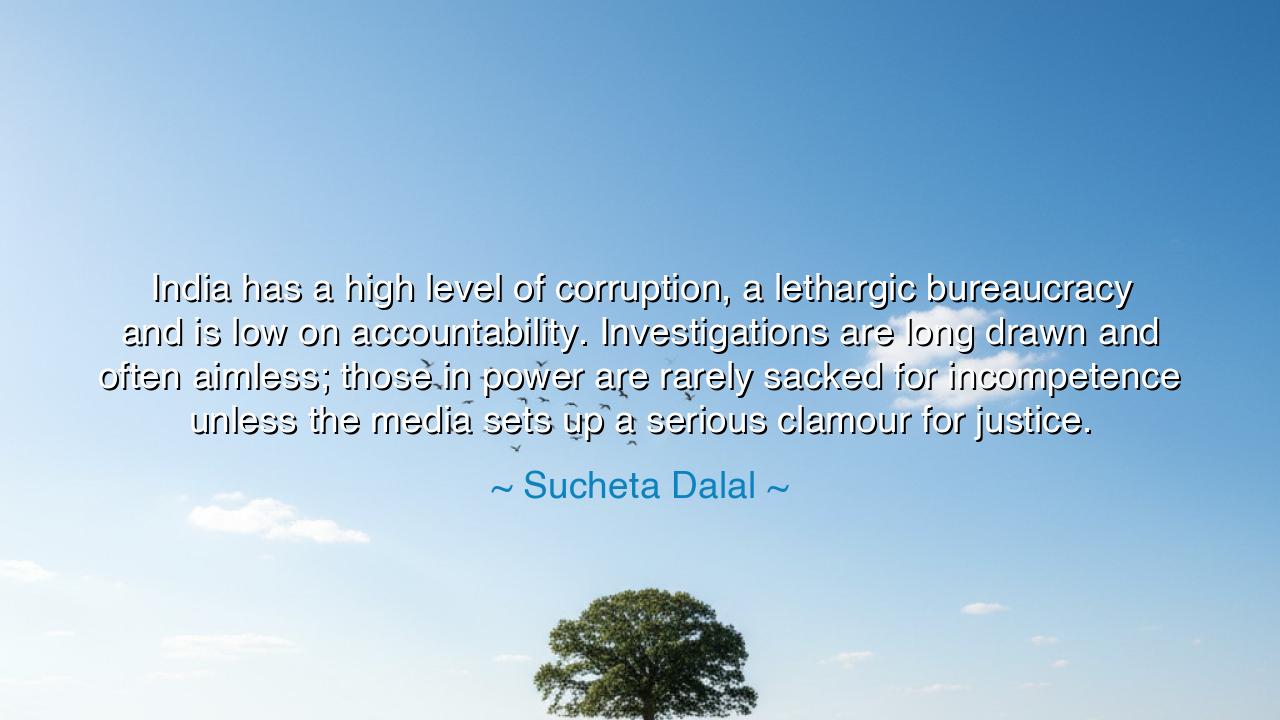
India has a high level of corruption, a lethargic bureaucracy
India has a high level of corruption, a lethargic bureaucracy and is low on accountability. Investigations are long drawn and often aimless; those in power are rarely sacked for incompetence unless the media sets up a serious clamour for justice.






In these piercing words, Sucheta Dalal casts light upon the shadows that plague the machinery of governance in India. She speaks of a land filled with promise, yet hindered by corruption, lethargic bureaucracy, and a dangerous lack of accountability. Her words are not mere criticism, but a lament for a nation whose greatness is often undermined by those entrusted with power. When officials cling to their positions, shielded by inefficiency and apathy, the spirit of the people suffers, and justice becomes a distant dream.
The image she paints of investigations that are “long drawn and often aimless” reveals a system where truth is not sought with urgency, but smothered beneath layers of delay and distraction. This deliberate stalling serves the powerful, for time becomes their ally, eroding public memory and weakening outrage. In such a world, the sword of justice grows dull, not through lack of laws, but through lack of will to wield them. It is a tragedy repeated throughout history, where those meant to protect the people instead protect themselves.
Sucheta reminds us that those in power are rarely punished unless the media raises a serious clamour for justice. Here lies a paradox: while rulers fail in their duties, it is often the voice of ordinary citizens, amplified through fearless journalism, that brings truth to light. This recalls the role of the town criers and storytellers of ancient times, who risked their lives to reveal the misdeeds of kings. In modern India, the media becomes the last guardian of accountability, its relentless spotlight forcing action where silence would otherwise reign.
History offers sobering parallels. During the final years of the Roman Empire, corruption flourished unchecked as senators enriched themselves while neglecting the needs of the people. Bureaucratic stagnation and self-interest weakened the state until it could no longer defend itself, leading to its eventual collapse. Likewise, India’s struggle with corruption serves as a warning: when those in authority are insulated from consequence, even the strongest nation may falter. It is only through constant vigilance and the courage of reformers that the tide can be turned.
Thus, Sucheta’s words are both a diagnosis and a call to action. They teach that justice is not self-sustaining; it must be demanded and defended by the people. The media, civil society, and every citizen must rise as warriors of truth, refusing to let lethargy and deceit take root. For when corruption is met with silence, it grows like a poison vine, strangling the future. But when voices unite in righteous clamour, even the most entrenched powers can be shaken, and the light of accountability restored to the realm.






AAdministratorAdministrator
Welcome, honored guests. Please leave a comment, we will respond soon